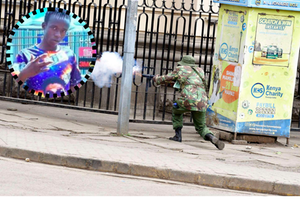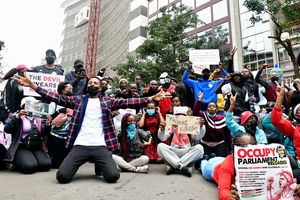
President William Ruto (centre), Interior Cabinet Secretary Kithure Kindiki (left) and Inspector General of Police Japhet Koome during the passing out parade of police officers at the National Police College in Kiganjo on January 10, 2023.
By Kamore Maina
President William Ruto has met security chiefs for talks following concerns about the handling of protests and apprehension that demonstrations against unpopular tax proposals could escalate.
It has also emerged that police are crafting a strategy to respond to the changing public demonstration landscape.
Police were caught unawares as the young protesters were unarmed and largely peaceful.
The Sunday Nation has learnt that with more protests expected this week, police are mapping out key government installations that are out of bounds for marchers, including State House and Parliament, where MPs will debate changes on the Finance Bill, 2024 which sparked the demonstrations.
Sources in the security sector said among the top officials who attended the State House meeting on Friday were Interior Cabinet Secretary Kithure Kindiki and Inspector-General of Police Japhet Koome.
Concerns were raised that authorities had not cracked the coordination of the protests and strategies to contain them without brutality.
Investigations have been launched into the shooting to death of a 29-year-old protester in Nairobi on Thursday. Another protester aged 21 succumbed to injuries on Saturday.
Hidden hand
There were questions on whether there was a hidden hand in the ongoing demonstrations.
The source talked to the Sunday Nation about discontent among senior police officers.
Some say there are no new plans to tackle the protests largely made up of young people, with last week’s response criticised as being guided by a manual applied during anti-government demonstrations last year which led to many deaths.
Clear policy
Other top police chiefs complained that operations during the protests were affected by lack of a clear policy and command guidelines.
The police chiefs said lack of guidelines by the leadership had led to confusion and poor coordination of response and deployment.
The sources said as a tradition, the IG would have called a meeting of his commanders to craft a response-operation plan.
Police chiefs who must attend such a meeting is the Deputy IG in charge of the Kenya Police, Deputy IG Administration Police, Directorate of Criminal Investigations boss and the General Service Unit commandant.
The meeting would also be attended by key section heads like regional police commanders and the director of operations.
It is from their deliberations that the Inspector-General of Police would arrive at an operational directive on how to handle the situation.
These operational guidelines would then be shared with the Interior Cabinet Secretary for further consultations.
After adoption, the commanders would then be tasked to pass the decision to their juniors on the ground.
Sources familiar with the events at the National Police Service Headquarters told the Sunday Nation that Mr Koome is yet to hold such a meeting with commanders.
The source added that so bad is the situation that an operation order that was used by police chiefs during these protests was a copy paste of the one used during the opposition Azimio la Umoja alliance demonstrations mid-last year.
Contacted on phone on June 22, the Inspector-General denied claims of quelling the protests with an outdated operation order.
“There is an order guiding this operation. We are not doing things anyhow,” Mr Koome said.
The Inspector-General added that his office has devised an elaborate plan that will lock protesters from government installations.
“State House, the National Assembly as well as the Nairobi Dam are out of bounds,“ Mr Koome said.
“It is their right to picket but lawlessness will not be tolerated.”
The police chief also rejected claims by politicians and activists that there was no proper planning of security during the demonstrations.
In a press conference, opposition leaders called on Mr Koome and Nairobi Police Commander Adamson Bungei to resign “for poor handling of the demonstrations”.
“We demand that Mr Koome and Mr Bungei immediately tender their resignations for failing to protect peaceful demonstrators,” the statement by the Azimio la Umoja One Kenya Coalition said.
The Inspector-General yesterday said he would not comment on the call to quit.
“I am an officer of the law and not a politician. I am non-partisan,” he said.
There are reports that Mr Koome’s statement on Thursday as the protests raged was made following prompting by his juniors who were uncomfortable with his silence.
In the statement issued around 5.30pm, Mr Koome said police would not allow protesters to access Parliament or any other government office.
“The service will neither condone nor approve efforts by demonstrators to occupy or disrupt the ongoing parliamentary proceedings,” he said in the statement.
Reached for comment, President Ruto’s Press Secretary Emmanuel Talam, there was no such meeting.
Faces threats
Top officials in the Interior Ministry had not responded by the time of going to press.
An official who declined to be quoted said such meetings “are routine” whenever the country faces threats.
Next week could be hectic for police after the organisers of the protests released a week-long calendar of events.
According to a schedule released on social media on Friday, the planners using the “”Occupy” banner asked the clergy to deny politicians who voted for the bill a chance to speak in church.
Protests
They have asked Kenyans to take the protests at the constituency offices of MPs who voted for the bill tomorrow.
As MPs vote on the amendments to the Finance Bill, 2024 on Tuesday, the protesters say they will breach the security cordon and besiege the building.
Organisers of the marches have threatened to paralyse key activities and asked parents to keep their children at home.
The protesters say they will be at the offices of the Independent Police Oversight Authority and the Inspector-General of Police to demand justice for those killed and injured by security agents.
The protesting groups plan to march to State House on Thursday.
The meeting with security chiefs followed another last Tuesday. That was after Dr Ruto’s meeting with ruling coalition MPs at State House before the debate on the bill began.










